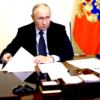
With new U.S. action today against Moscow, Russiagate remains like a vampire, with no one able to drive a wooden stake into its heart and keep it there.
Like Team Mueller’s indictment last July of Russian agents, the full report reveals questions about Wikileaks’ role that much of the media has been ignoring, writes Daniel Lazare.
A battle for democracy within the Democratic Party is underway and the heirs of Bill Clinton’s New Democrats are trying to stack the deck, says Norman Solomon.
Tom Perez’s lackluster first year as head of the Democratic National Committee provides a metaphoric glimpse into the waning influence of the Democratic Party as a whole, explains Norman Solomon.
Still refusing to face why Donald Trump and the Republicans won in 2016, the national Democratic Party rebuffs proposals from progressives to make the party more democratic and less corporate-dominated, writes Norman Solomon.